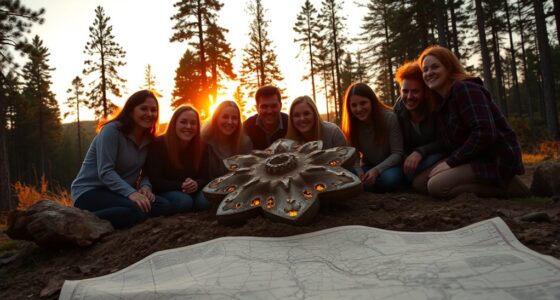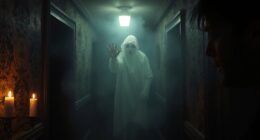Working long nights in haunted places heightens your senses, making shadows and sounds seem more threatening. Darkness and isolation activate your survival instincts, boosting adrenaline that can both sharpen perceptions and cause paranoia. Your beliefs and cultural background influence how you interpret eerie sensations, while exhaustion can lead to hallucinations and distorted reality. Connecting with others and using coping strategies like grounding can build resilience. Stay aware of these psychological effects, and you’ll uncover ways to better manage the experience.
Key Takeaways
- Darkness and isolation activate survival instincts, heightening sensitivity to sounds and shadows, which can amplify fear and hallucinations.
- Prolonged exposure to haunted environments triggers stress responses, mood swings, and cognitive distortions, impacting mental resilience.
- Fear enhances sensory perception but may cause misinterpretation of stimuli, increasing anxiety and susceptibility to illusions.
- Establishing routines, grounding techniques, and social connections help manage stress and maintain psychological stability during long nights.
- Understanding personal beliefs and cultural influences can reduce unnecessary fear, improving coping and mental endurance in haunted settings.
The Impact of Darkness and Isolation on the Mind
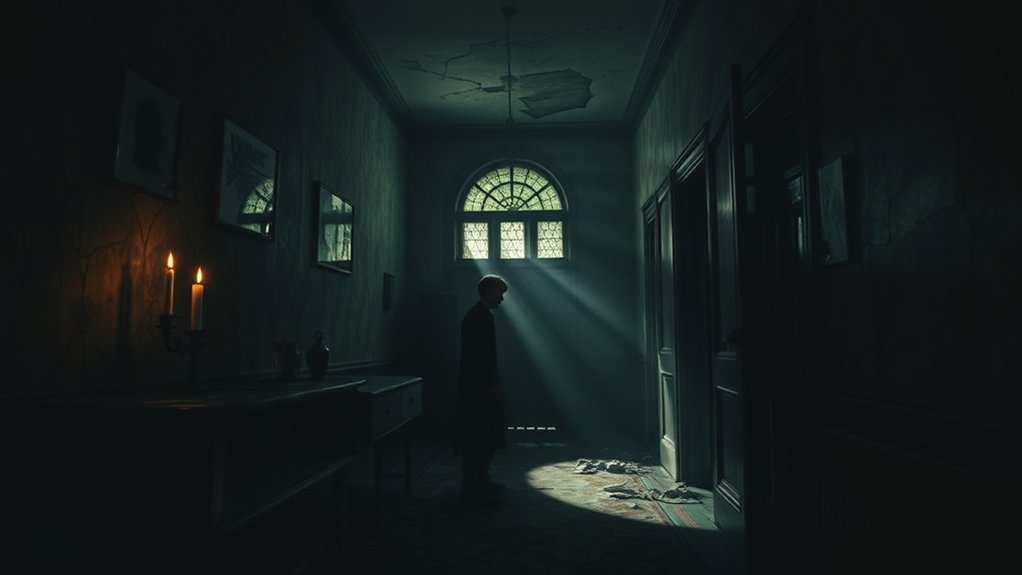
When working long nights, darkness and isolation can profoundly affect your mental state. Without natural light or social interaction, your brain shifts into survival mode, heightening your sensitivity to sounds and shadows. You might start to feel detached from reality, as your mind tries to fill the void with imagined threats or illusions. The lack of external stimuli causes your thoughts to become more intense and sometimes distorted, fueling feelings of loneliness or unease. Over time, this environment can lead to mood swings, difficulty concentrating, and even mild paranoia. Your body’s natural circadian rhythm becomes disrupted, making it harder to distinguish between real danger and imagined fears. Interestingly, exposure to natural light can help regulate your internal clock and improve your psychological resilience. Recognizing these effects helps you prepare and manage the psychological toll of prolonged darkness and solitude.
Fear and the Human Response System

When you feel fear during long nights, your body activates its fight or flight response to protect you. This increases your sensory awareness, making you more alert to potential threats. As a result, psychological stress responses can heighten, affecting your focus and well-being. Developing attention to detail can help you better recognize and manage these responses.
Fight or Flight Activation
The fight or flight response is your body’s immediate reaction to perceived threats, activating a complex system designed to protect you. When you sense danger, your adrenal glands release hormones like adrenaline and cortisol, preparing your body to act. Your heart races, muscles tighten, and your senses sharpen—readying you to confront or escape the threat. This response is automatic, rapid, and essential for survival, especially in haunted places where fear can spike suddenly. Recognizing this activation helps you understand your physical reactions. Here’s a quick view:
| Response Trigger | Bodily Reaction | Purpose |
|---|---|---|
| Perceived threat | Heart rate increases | Prepare for action |
| Sudden noise | Muscles tense | Quick response |
| Visual stimuli | Heightened alertness | Enhanced perception |
| Shadows or movement | Pupil dilation | Better sight in dark |
| Feeling fear | Cortisol release | Energy boost for action |
Additionally, awareness of the human response system can help you manage reactions and stay calmer in frightening situations.
Heightened Sensory Awareness
Heightened sensory awareness is your body’s natural way of sharpening perception during moments of fear, allowing you to detect threats more quickly. When you’re in a haunted place at night, your senses become hyper-alert. Your eyes pick up even faint movements or shadows, while your ears become more sensitive to distant sounds or whispers. Your skin may feel more tingly, sensing vibrations or changes in airflow. This heightened state helps you stay alert, scanning your environment for danger. Your brain filters out unnecessary information, focusing solely on potential threats. This on-device AI enhancement in your perception boosts your responsiveness—each creak or flicker becomes more significant. While it can keep you safe, it also amplifies your fear, making every sound and sight feel more intense and urgent.
Psychological Stress Responses
Have you ever wondered why fear triggers such intense physical reactions? When you sense danger, your body activates the fight-or-flight response, releasing adrenaline and cortisol. This surge prepares you to confront or escape threats, causing rapid heartbeat, sweating, and heightened alertness. These reactions are automatic, bypassing conscious thought. Fear also influences your perception, sharpening senses and making shadows seem more threatening. In individuals with BPD, emotional dysregulation can amplify these responses, leading to heightened fear responses during stressful situations.
Adrenaline as a Double-Edged Sword
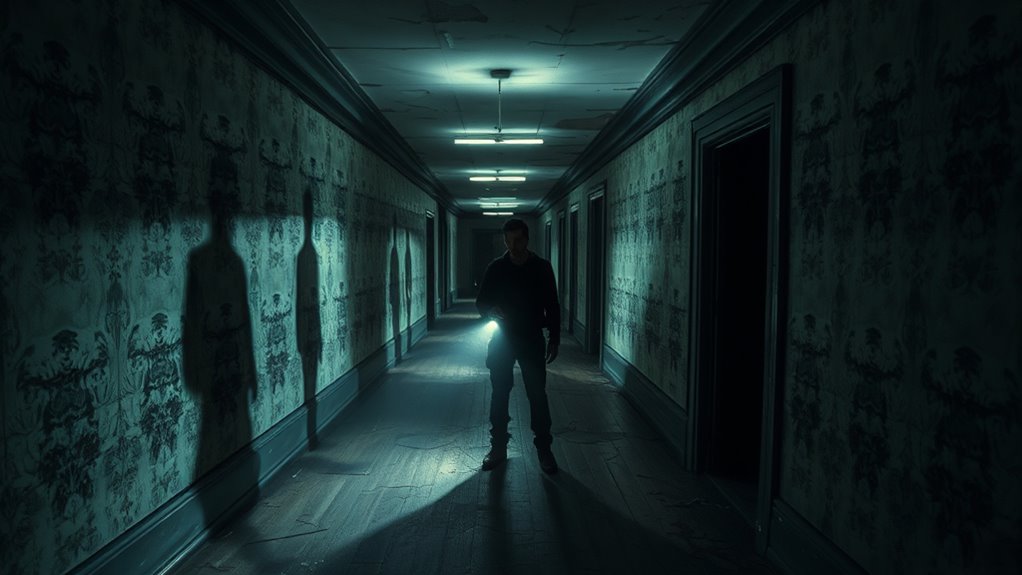
While adrenaline can provide a much-needed boost of energy during long nights, it often comes with significant risks. Your body floods with this hormone, sharpening your senses and temporarily increasing strength, which can help you stay alert amid the eerie silence. However, this surge also raises your heart rate and blood pressure, risking panic attacks or exhaustion once the adrenaline subsides. Overreliance on adrenaline can impair judgment, making you more prone to mistakes or risky behaviors. It may mask fatigue, leading you to push beyond safe limits, only to crash later. The temporary adrenaline rush might make you feel invincible, but it’s a double-edged sword—offering power while endangering your physical and mental health if unchecked. Engaging in a remote environment can help manage these effects by providing safer ways to channel adrenaline through virtual challenges.
Perception, Hallucinations, and Reality Distortion
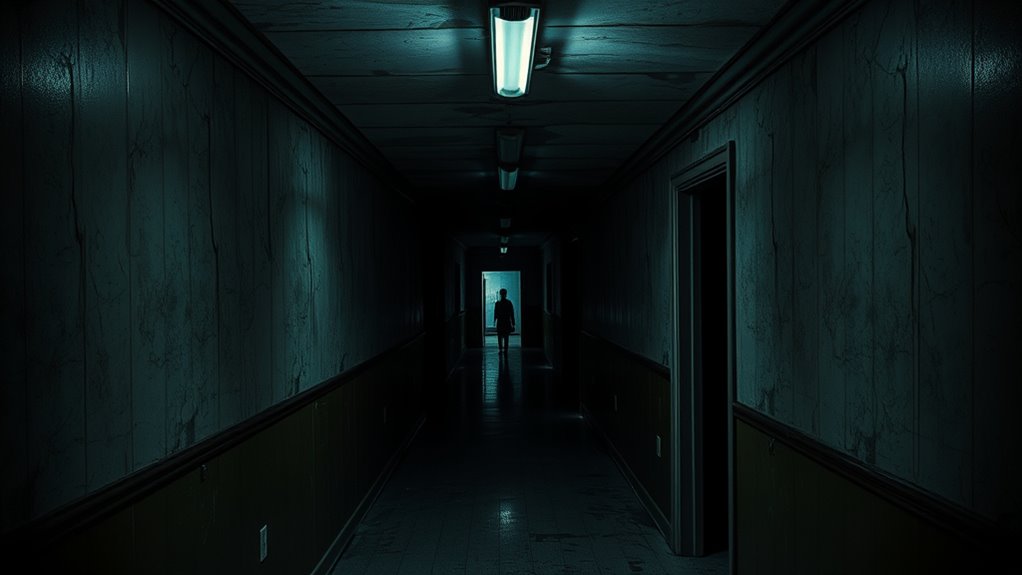
Long nights can distort your perception, making it harder to distinguish reality from illusions. As fatigue sets in, your mind becomes more susceptible to misinterpretations of sounds, shadows, and movements. You might see figures lurking in the corner of your eye or hear whispers that aren’t there. The darkness amplifies your fears, causing your brain to fill gaps with imagined threats. Hallucinations can feel incredibly real, convincing you that something unseen is present. Your senses become unreliable, blending actual stimuli with false perceptions. This distortion isn’t just psychological; it’s fueled by sleep deprivation, stress, and heightened suggestibility. Recognizing these tendencies helps you understand that what you perceive isn’t always true, especially during long, lonely hours in haunted places. An awareness of hallucination triggers can help you stay grounded and better differentiate between reality and illusion.
The Role of Cultural and Personal Beliefs
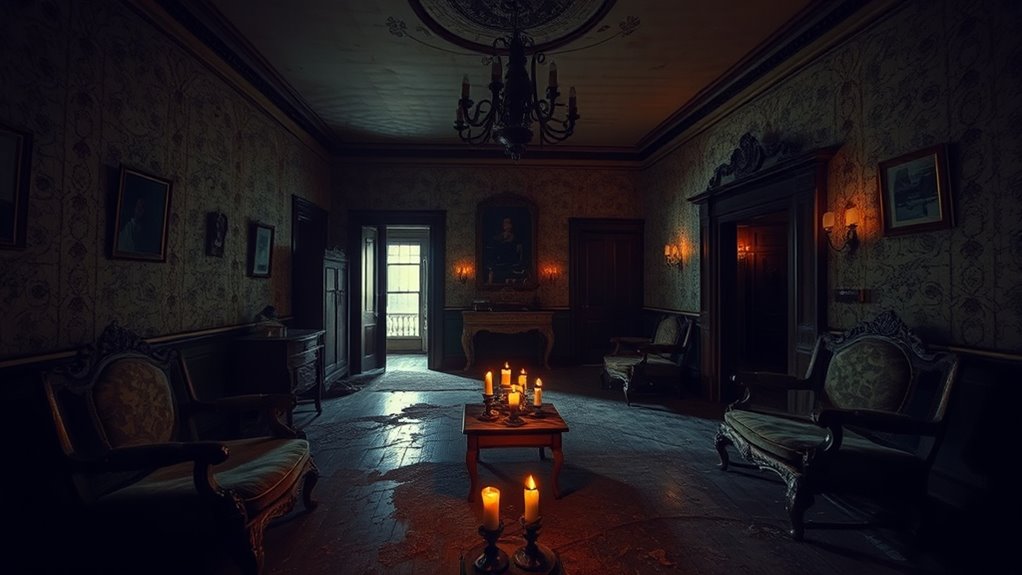
Your cultural beliefs about supernatural forces can shape how you experience working long nights, making you more prone to see or sense things that fit those ideas. Personal fears, conditioned over time, can intensify feelings of unease or hallucinations during extended work hours. Understanding these influences helps explain why your perceptions may vary based on your background and experiences. Additionally, dog names often carry cultural significance, which can influence how individuals interpret their surroundings and experiences in haunted places.
Cultural Supernatural Perceptions
Cultural and personal beliefs considerably shape how you perceive and respond to working long nights. If your culture associates haunted places with spirits or divine punishment, you’re more likely to feel anxious or paranoid. Conversely, cultures that see spirits as protective or ancestral may inspire feelings of reverence or comfort. Personal beliefs, shaped by upbringing or past experiences, also influence your reactions. For example, if you believe ghosts are harmless, you might stay more calm, while skepticism could lead you to dismiss potential signs of supernatural activity. These perceptions color your expectations and influence how you interpret unexplained sounds or sights. Recognizing the power of cultural and personal beliefs helps you understand why some people feel fear, curiosity, or indifference during long, haunted nights. Additionally, understanding the benefits of curiosity can encourage a more open-minded approach to exploring these supernatural environments without immediate judgment.
Personal Fear Conditioning
Personal fear conditioning plays a significant role in how you respond to the eerie sensations of working long nights, as your beliefs shape your emotional reactions. If you grew up hearing stories of hauntings, your mind is more likely to interpret strange sounds or shadows as supernatural. Your personal experiences and cultural background influence how intensely you fear these moments, making you more susceptible to panic or heightened alertness. Recognizing these beliefs helps you control your reactions, reducing unnecessary fear. Additionally, understanding the Vetted – Grobal World resources about indoor environments can help demystify some of these sensations.
Validation and the Need for Connection

Have you ever wondered why validation and the need for connection become even more urgent during long nights of work? As the hours stretch on, loneliness can intensify, making you crave reassurance from others. Your mind seeks affirmation that you’re not alone in facing the unknown, especially in haunted or unfamiliar places. This need for connection taps into deep-seated human instincts; it’s a way to feel grounded amid uncertainty. When you receive acknowledgment or camaraderie, it reduces feelings of isolation and boosts your confidence. Even brief interactions can provide a sense of belonging, helping you push through the night with a little more resilience. Recognizing this craving helps explain why human connection becomes a essential psychological anchor during these challenging hours.
Coping Mechanisms and Resilience in Unfamiliar Environments
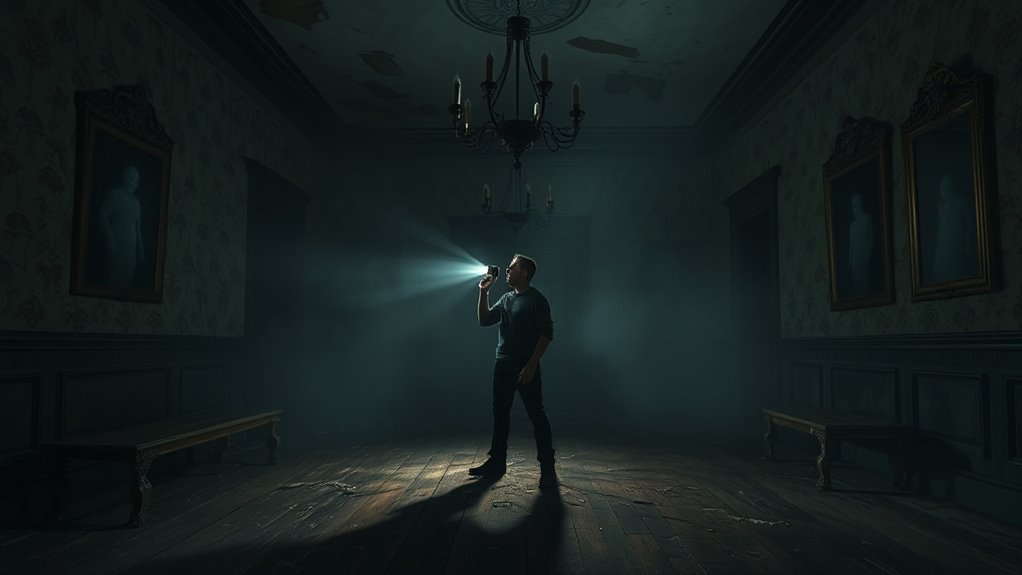
When you’re in unfamiliar environments during long nights of work, developing effective coping mechanisms becomes essential for maintaining resilience. You can start by establishing simple routines—like taking short breaks, deep-breathing exercises, or listening to calming sounds—to manage stress. Staying grounded with familiar objects or routines helps reduce anxiety and creates a sense of control. Connecting with colleagues or fellow workers provides emotional support, reminding you that you’re not alone. Maintaining a positive mindset is also vital; focus on your purpose and strengths rather than fears or uncertainties. Remember, resilience isn’t about avoiding stress but adapting to it. By actively employing these strategies, you build mental toughness, enabling you to navigate the challenges of unfamiliar, haunted environments more confidently and effectively.
Frequently Asked Questions
How Does Sleep Deprivation Influence Haunted Place Experiences?
Sleep deprivation heightens your sensitivity to eerie sights and sounds, making haunted places feel even more terrifying. When you’re tired, your brain struggles to differentiate between reality and imagination, causing hallucinations or exaggerated fears. You become more prone to noticing small details that seem sinister and feel less capable of rationalizing the experience. This combination amplifies the haunted atmosphere, making every creak and shadow seem more intense and real.
Can Past Trauma Affect One’s Perception of Haunted Environments?
Your past experiences can cast a subtle shadow over how you perceive haunted environments. If you’ve faced deep emotional wounds, you might interpret strange sounds or shadows as reflections of those memories, rather than supernatural phenomena. These echoes of trauma can heighten your sensitivity, making you more prone to fear or unease in eerie settings. Recognizing this connection helps you understand your reactions, allowing you to approach haunted places with a mindful perspective.
What Are the Physiological Effects of Prolonged Nocturnal Work Shifts?
When you work long night shifts, your body undergoes several physiological changes. You may experience disrupted circadian rhythms, leading to sleep problems and fatigue. Your cortisol levels can rise, increasing stress, while melatonin production drops, affecting alertness. Over time, these shifts can weaken your immune system, cause mood swings, and impair cognitive function. You might also develop cardiovascular issues, highlighting the importance of proper rest and self-care during extended nocturnal work.
Do Cultural Backgrounds Alter Fear Responses in Haunted Settings?
Absolutely, your cultural background can dramatically shape how you react to haunted settings. It’s like carrying a mental map that highlights what’s frightening or familiar; some cultures see spirits as protective, while others view them as malevolent. This influences your fear response, making you more or less sensitive to eerie sounds or sights. So, your cultural lens acts as a filter, amplifying or softening your fear in haunted environments.
How Does Social Support Impact Psychological Resilience During Night Work?
Social support plays a vital role in boosting your psychological resilience during night work. When you have colleagues or friends you trust, you feel less isolated and more secure, which helps you manage fear and stress better. Sharing experiences and seeking reassurance strengthen your mental toughness, enabling you to stay calm and focused. With strong social support, you’re more likely to withstand the psychological challenges that come with working long nights in haunted or high-stress environments.
Conclusion
As you navigate the shadowed corridors of haunted places, your mind becomes both a battleground and a mirror, reflecting fears and fantasies alike. Darkness weaves a tapestry of perception, where reality blurs and hallucinations dance like flickering flames. Yet, within this labyrinth of shadows, your resilience shines—a steady beacon guiding you through the night’s haunted symphony. Embrace your inner strength, for even in darkness, your spirit remains an unyielding light.



